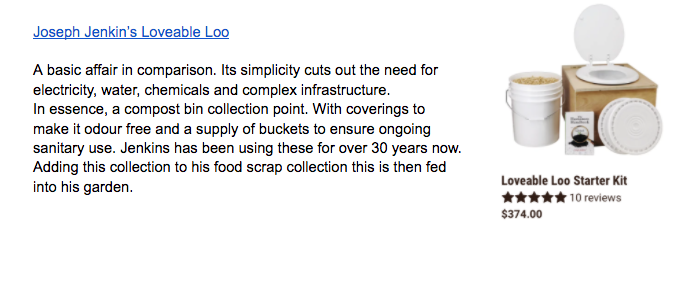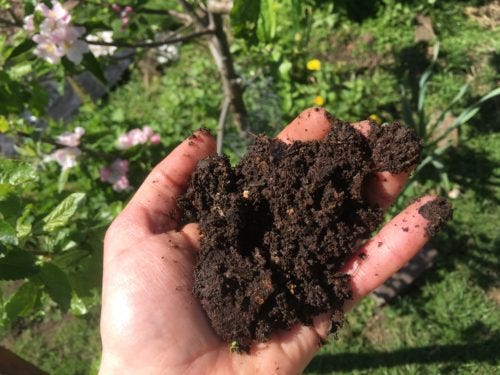Paradigm Shi(f)t: Keeping Our Poop as Humanure?
Our poop might not sparkle with the colours of the rainbow or smell of sweet roses but it is considered by some as a gift! “The legacy” as it has been hailed, is a rich nutrient; an asset wrongly understood as waste. Think back to being 5 years old. If you were like most 5 year olds — the word ‘poop’ or ‘poo’ would break your face into laughter and unshakable smiles! There must be more to it than just unsightly waste.
The long standing human mindset of “out of sight, out of mind” fed into the design of the centralised water-based sewage model. This ‘disconnect’ mindset is beginning to haunt us: billions of people do not have access to safe drinking water and sanitation and the climate crisis is scaling up its symptoms.
Innovators point to increased flooding leading to the merging of our wastewater with our drinking water. The European Court has slammed the UK’s sewage infrastructure’s raw material spillage. Sewage is leaked into rivers, washed up on beaches. The Bill and Melinda Gates Foundation highlight the health dangers posed to the poorest nations due to insufficient management of human ‘waste.’
Sustainability is surely not the solution here.

Image: cordis.europa.eu.
Complex problems invite new solutions: A regenerative solution.
Circular, decentralised models are cropping up in every sector and divert away from the ‘use, lose’ trend we are used to. Instead of using and burying things under the carpet (or down the ‘crapper’), we close off the exit points to ‘waste.’ Waste is coined into ‘asset’ or ‘value’ and used again or in a new context. In other words, we keep our poop in the loop. Composting?
This echoes ideas present in human history. Go back to 3000bc and hunter gatherers would apply the ‘drop and go’ method. Human population figures of today though, make this a toxic affair: A sanitation shitshow. Melting under the sun in populated streets, sometimes within a plastic bag, solid waste spews disease and pathogens. So what can we do instead, without plundering water and taking risks to human health?

From the Preston Chronicle, Saturday, February 26th, 1859
Victorian sewage workers tousled with the mainstream habit of chucking the waste into disuse, but were met with resistance as it was believed the general household would struggle to manage this process.
Enter: Compostable/Dry Toilet
Would you?
The Dry Toilet innovations are out there and access is coming. The idea may inspire an image of the festival goer or the garden hippy and we may feel it rather easy to dismiss the notion as amateur or low tech. And, why not? We have been used to the sparkling facade of the tiled bathroom and its magic ability to wash things away.
The compostable ‘thrones’ use no water, have no need for drains and connecting pipes and leave out the harmful chemicals. Instead, these compost collecting points are dry, made up of compostable and reusable components and promote self sufficiency. Let’s take a look at an example or two:

Kildwilk.com

Loveable Loos
For a singleton, living in an apartment without a garden, I am quick to see this as a struggle; both in price and in a practical sense. That said, Nance Klehm, compost expert, points out that 30% of our water bills go to the toilet. Not only is that a cost to my pocket, but also to the planet’s freshwater supply. Would the compostable option, although costly to begin with, turn out to be a worthy investment?
The other advantage, to those with a garden, is the return your “shit” can bring! The Humanure Handbook by Joseph Jenkins exhibits the riches coming from composted waste.

Compost: waste to asset
Efforts cum natural habits have landed Jenkins with a garden full of produce — his dung feeding a whole host of fruit and vegetables. Another saving made! Insert another urbanite grumble: What if you don’t have a garden? Jenkins talks of having your waste collected to be added to a larger composting facility. This is something I will need to consult with my local area about, I guess. With the Humanure Handbook translated around the world and on its fourth edition — something smells promising!
But is my Shit Safe?
It is a fact that our excrement contains pathogens and toxic ingredients — hence the effort our bodies apply to its removal. Am I prepared to eat vegetables grown in my own waste product- or even grown on farms using other folk’s excrement? The Reinvented Toilet Expo addresses these same questions of safety. Innovators from a global reach are coming together aiming for safe sanitation, the elimination of pathogens and to help keep waste in the loop — as fertiliser. The non-sewered sanitation industry is favoured as highly marketable and relevant to the world right now. The United Nations prediction of the urban population density on the rise — up to 70% in 2050 — world governments and investors are pumping into a sanitation overhaul. We can’t afford not to. To Bill Gates it is a vital disruption which is no longer about whether invention is possible but rather “how quickly this new category will scale.”
Iam not about to dash out for a compost bin toilet just yet but with the idea having already grown roots and now flourishing into a systematic global disruption — I am all ears. To the Regenerative Movement; this shit just got real!